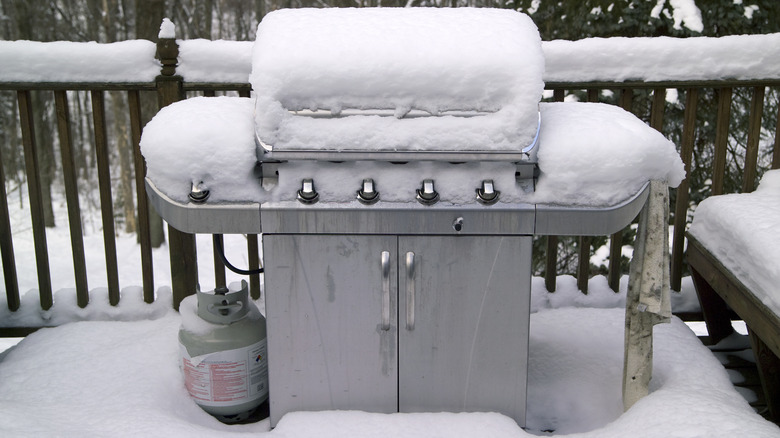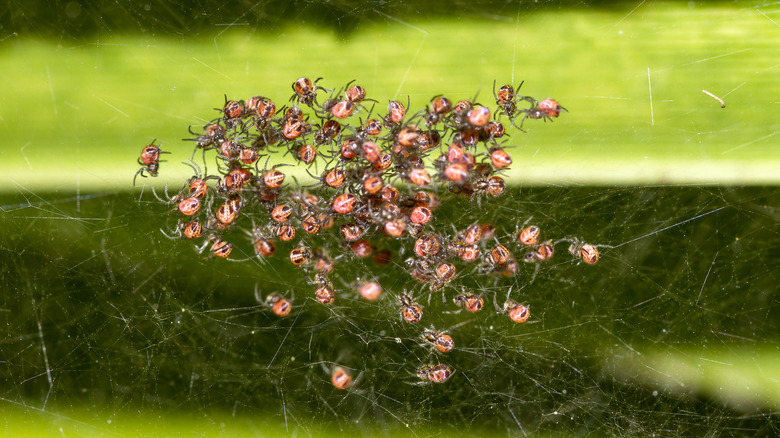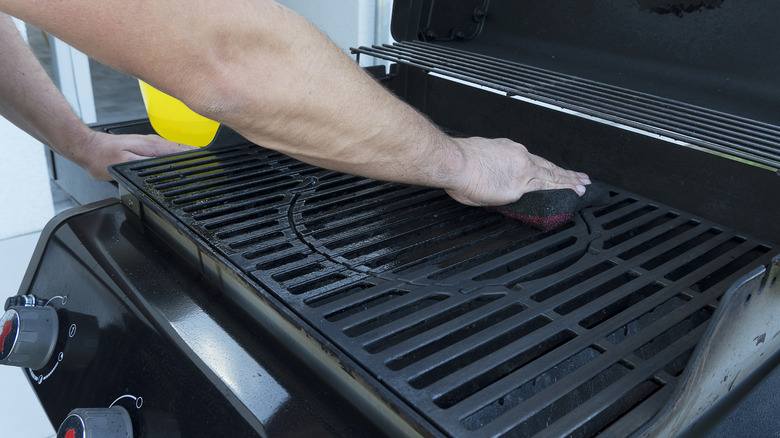How To Keep Spiders Out Of Your Grill When Storing It For Winter
Outdoor grills are a cherished symbol of summer, but they're often popped open in the springtime and kept sizzling until the fall temperatures drop. Gas grills have many moving parts that need care when not in use, so when winter's on the horizon, it's not enough to simply zip up your grill cover and let it stand on the deck collecting snow. Among other steps, it's crucial to properly winterize your grill by removing the burner and wrapping it in plastic to prevent spiders – yes, spiders — from sneaking in and nesting there.
If spiders take up residence in your barbecue, your grill's performance can become suddenly and inexplicably reduced. You may notice that it's hard to get the grill to light at all or to keep the right temperature. While it used to be able to sustain a higher heat, it can't anymore. Instead of a healthy blue, the flames can sputter and become yellow. But besides the ick factor, the biggest danger spiders pose is that their presence creates conditions for a flash-back fire.
Why this is blazingly important
Spiders are homebodies — they like settling down in a cozy little spot where they can spin a web, build a nest, and lay an alarming amount of spider eggs. Who knew that spiders enjoy the smell of propane gas and that their scent preferences could cause potentially explosive problems the next time you fire up your grill? They will climb metaphorical mountains to get inside your grill's burners or venturi tubes (those are the tubes that feed gas from the control panel to the burner) to enjoy the delicious-to-them smell of propane gas.
Here's what happens when they do. When spring is finally here and you turn on the gas for your inaugural barbecue, the blockage your spider friends have created with their nests and eggs prevents the gas from flowing into the burner, instead backing up into the venturi tube where it can cause a flash-back fire right under your control panel. A fire that springs up outside of the burner box or near the valves can ruin the control panel knobs and the grill itself, or cause injury to yourself and your property. But if you winterize properly, you can prevent this fiery spider drama.
How to keep the spiders out step by step
The first step in winterizing your grill is to disconnect the gas. Then it's important to clean off food particles and the acids they leave behind. Unless the instructions for your grill suggest otherwise, for a squeaky clean grill, use steel wool, mild dish soap, and water. Do check the manufacturer's instructions about how to disconnect the burner. You might need to remove coverings like a "Flavorizer," and unplug cotter pins, clamps, and any brackets that keep the burner in place. As a precautionary measure, it's a great idea to get a tiny, long brush and swab out your burner and the venturi tube to remove any hint of a nest. Then, to prevent rust from forming, coat the cooking areas of your cleaned grill with vegetable oil. A can of spray oil works best to keep the parts lubricated.
Spray the burner you just removed with oil too. We suggest wrapping it tightly in plastic wrap and then placing that inside a plastic bag. Many venturi tubes come equipped with spider guards, but not all — you might cover any openings with aluminum foil, keeping it in place with a rubber band if possible, then make sure to remove any aluminum before using the grill. Rest the burner in its plastic bag on the grill. After you cover the grill with its fabric coat, allowing air to come in at the bottom, keep it in the garage, shed, or otherwise out of the elements, not outside.


